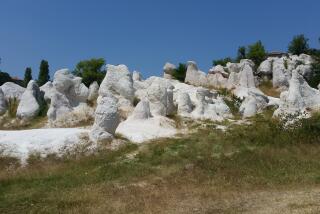Monkeying Around With Life and What It Means
- Share via
Atrip to Egypt makes one contemplate the mysteries of life. Seeing the great works of people who lived 5,000 years ago makes us wonder again: Where did we come from?
I believe life is a product of random chance, but that cannot be proved, and some scientists deny it. However, the theory of creation (by a supreme being) is equally unprovable.
Thayer Smith of Downey holds that it’s extremely unlikely that “the enormously complex structural and biochemical arrangements of a single form we call living could have occurred through random collisions of molecules.”
To illustrate this, he offers a mathematician’s analysis of the old theory that enough monkeys typing at enough typewriters would eventually, through random chance, type the Bible, or any other work of literature you care to use.
The work most often used in this speculation, I believe, is the first paragraph of Charles Dickens’ “A Tale of Two Cities.” It is an exemplary piece of writing, and one known to every student of English literature.
It begins: “It was the best of times, it was the worst of times, it was the age of wisdom, it was the age of foolishness. . . .”
To prove his point, Smith called upon Boyd Benson, professor of mathematics at Rio Hondo Community College, who obligingly provided an answer, assuming that 1 billion monkeys, striking one key 100 times a minute, typed hour after hour, day after day, 365 days a year.
I believe I’ve heard that six monkeys could sooner or later write “For Whom the Bell Tolls,” but that may have been a criticism of Hemingway rather than a mathematical probability.
Prof. Benson has provided Smith with two pages of calculations that are beyond my understanding, although he has taken great pains to go step by step. If I grasp his conclusion, it is that for 1 billion monkeys to come up with Dickens’ first paragraph, it would take “too long to be considered.”
I agree that the figure would be too long. One would hardly want to wait.
How this proves, however, that life was created by a supreme being, I don’t know. Assuming that a supreme being created “the enormously complex structural and biochemical arrangements of a single form we call living,” then what created that infinitely more complex supreme being?
Rather than trying to solve that probably unsolvable riddle, I am really more interested in whether any number of monkeys could ever write anything sensible by random chance. What about chimpanzees? Would they have a better chance? Chimpanzees are said to be only one gene different from us. Might not a sport come along who could write the poems of Longfellow?
It seems to me that some examples of contemporary poetry are not too far beyond the skills of a chimpanzee. In reviewing a book of criticism recently in the Times’ book section, poet Thomas M. Disch quoted a poem that, he said, the author evidently considered worthy of notice. It began:
Again and again. And so on. And so forth. And back again.
And once more. And one more time. Again and again and
through and through, and through. Over and
over again and again . . .
It ends with two pages of “and on and on and on. . . .”
I don’t know what figures Prof. Benson might come up with, but I would like to know what the probabilities are that a given number of chimpanzees--say eight--could come up with that poem, and how long it would take them.
I’m afraid, though, that there’s one factor the professor might not be able to consider. It seems to me a chimpanzee might be able to duplicate that poem--or at least write one just as sensible--from sheer literary skill, without the help of random chance.
Chimpanzees really aren’t that dumb.
Meanwhile, I continue to receive theories about the meaning of life, which I explored some time ago. Walter J. VanderVort of North Hollywood writes of a pilgrim who climbed into the Himalayas to ask a wise man what the meaning of life was. He found the old man in a cave and asked the question. The old man replied: “If I knew the answer to that, would I be living in this cave?”
John M. Freter of Yucca Valley writes of a man who made his way, after years of wandering, to the abode of a wise old guru, of whom he asked the question. The old man answered: “Life is like a barrel.”
Astounded, the seeker said, “Life is like a barrel!” And the guru said, “All right, already. So life isn’t like a barrel.”
That seems to me to be getting pretty close to the answer.





